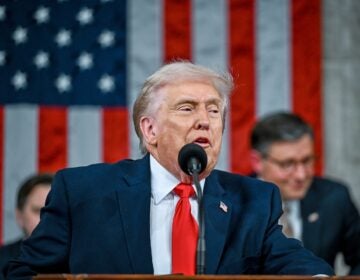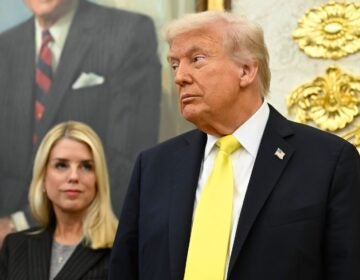Targeting of nationalities and not individuals is why Trump’s travel ban fails

Visitors view the Statue of Liberty during a ferry ride to Liberty Island in New York. (AP Photo/Bebeto Matthews, File)
There is a general consensus in the U.S. that we need to protect ourselves and not allow people who wish us harm to pass through our borders.
The two executive orders from President Trump on Jan. 27 were both game-changing policy instruments. The order introducing the details of “extreme vetting” is a valuable first step to begin the implementation of necessary changes to U.S. immigration policy and apply it to those who clearly should not be allowed into our nation.
The travel moratorium, while claiming similar intent, was poorly rolled out and badly formed. By failing to work and consult with, or at least alert, the various federal departments, legal experts and security officials, it’s not surprising that this order will likely not be implemented as planned.
While many focused on its supposed religious targeting, the larger issue with the moratorium is its focus on nationalities rather than concentrating on specific individuals and those influenced by certain ideologies anathema to U.S. interests.
It is easy to implement a blanket ban on emigres from specific countries, but it will be harder to put in place significant structural changes to guard against extremists posing as harmless refugees. No improvements can truly occur until we recognize our immigration system must be reformed from top to bottom.
A proper system will allow U.S. immigration officials to discern who among those seeking entry to our country are potential friends who share our values versus those who are anti-American and hope to shrug off American values after their arrival. By focusing exclusively on nationalities as opposed to individuals, we leave ourselves open to the risk of failing to notice a person who has been radicalized.
The issue of “extreme vetting” came up frequently during Mr. Trump’s campaign as an exclusive concern on keeping out Islamists and those who would value violent ideologies over American law. The term “Islamists,” as opposed to “moderate Muslims,” refers to the approximately 10 percent to 15 percent of Muslims who seek to apply archaic Islamic law in its entirety, including restricting women’s rights, subjugating non-Muslims, and idolizing violent jihad.
The western world has identified the rise of Islamism as synonymous with extremism, turmoil, and violence. However, it is the minority who are the problem, and to punish and label entire Muslim communities is wrong and dangerous. Working with anti-Islamist Muslims is the key to ending this radical surge, a fact that has been recognized by both Republican and Democratic administrations.
The complex challenge of identifying Islamists in the immigration process points to the need for a thorough and exhaustive investigation on the individual level. Identifying Islamists is no easy matter. There is nothing to distinguish them when it comes to clothing, careers, devoutness, or political views. Islamists often dissimulate and pretend to be moderates, and some change their views over time.
The executive order calling for new “Uniform Screening Standards,” if implemented properly, will prevent individuals from entering the U.S. “on a fraudulent basis with the intent to cause harm, or who are at risk of causing harm subsequent to their admission.” It contains two main components, in-depth research and intensive interviews.
These new standards have plenty of critics, namely those who claim that the entire procedure is less reliable, too arduous, or even unlawful. The argument that a no-Muslim policy is more reliable is senseless and wrong — an exclusive religious litmus test shouldn’t exist. It is one question amongst many that should be applied to potential emigres.
It is true that the proposed procedures will be expensive and slow and will place a very heavy burden on U.S. immigration officials. However, this is the reality of what it takes for the U.S. to maintain an immigration policy that both welcomes those who wish to assimilate and denies entry to those who wish to cause harm and chaos.
Any individual who seeks residency in the U.S. must, by law, be approved and strive to abide by the principles of our Constitution. By embracing extreme vetting, we can move past what Lee Smith calls “judicial arrogance” and “political hysteria” and finally place total trust in our immigration procedures. No amount of time, money, or resources should prevent our government’s ability to keep its citizens safe.
—
Gregg Roman is the director of the Middle East Forum an independent nonprofit organization based in Philadelphia since 1994
WHYY is your source for fact-based, in-depth journalism and information. As a nonprofit organization, we rely on financial support from readers like you. Please give today.




